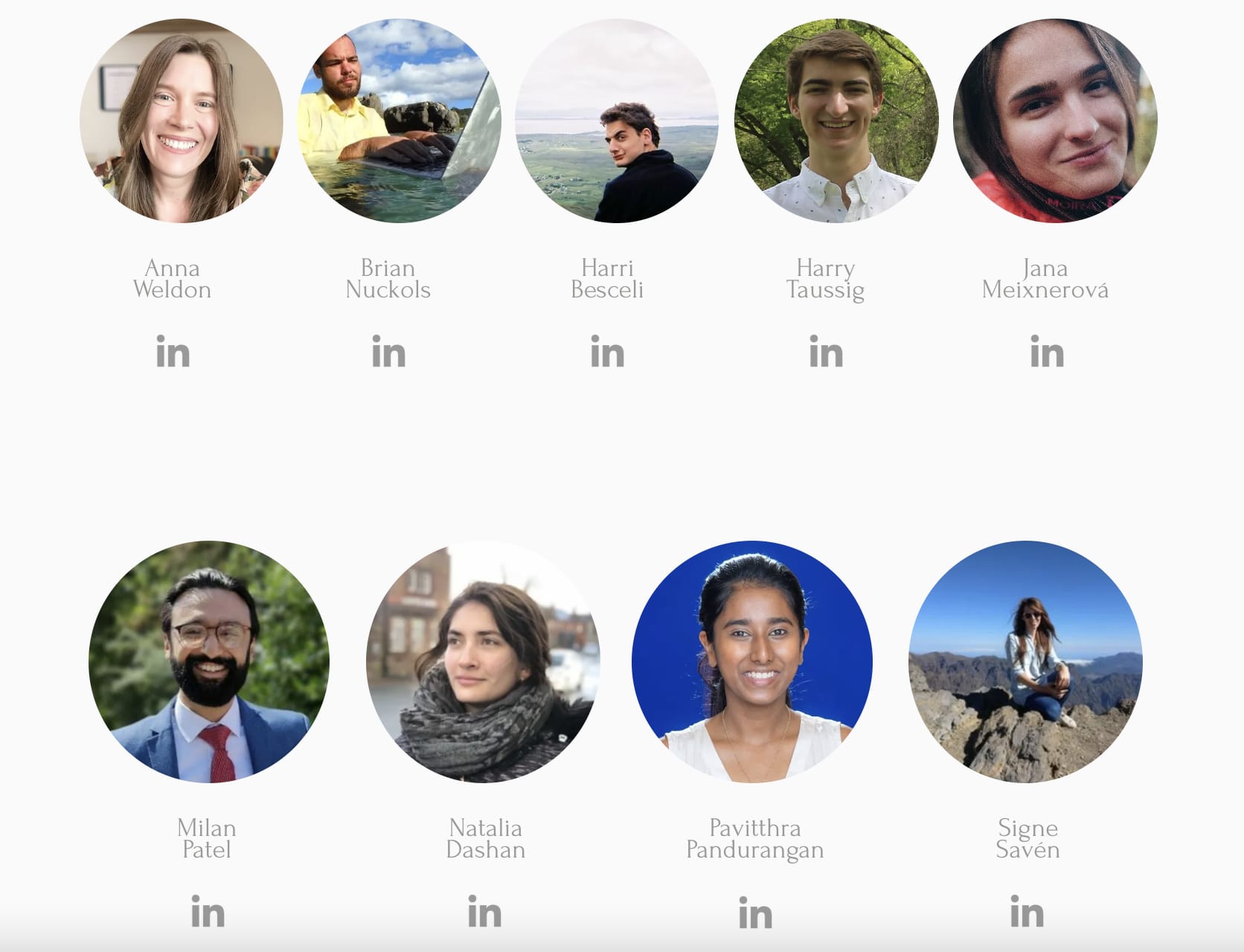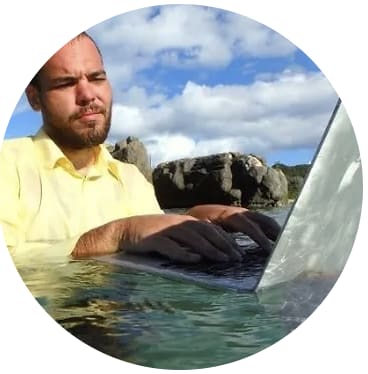Table of Contents & Key Links
TLDR
Tldr: applications are now open for a free matchmaking service with a tightly integrated cohort of 9 coaches eager to serve effective altruist, rationalist and other nearby communities.
This matchmaking service is embedded within the Tee Barnett Coaching Training (TBCT) program, an iterative learning project that was constructed to enrich and hopefully reshape the landscape of well-being support.
In addition to meaningful personal and professional growth that our coaches hope to facilitate for you, we’re intending for your work with TBCT coaches to double as an indirect investment in human capital and wellness support infrastructure building.
Insight and learnings derived from TBCT coaching relationships will inform current and future iterations of the program. Over time, we hope to serve more people, help normalize receiving support, become better at training practitioners, cultivate higher-trust referral networks, and lay the foundations for directing or deploying skilled well-being support for those working in scalable good and existential risk reduction fields (e.g. AI safety).
Disclaimer on intended audience
This post is for those who already feel that individualized well-being support, particularly coaching, could plausibly play an important role in their own personal and professional development; even more so for those who feel personal investments of this sort could meaningfully contribute to the long arc of their impact aspirations.
Discussions around the general case for the effectiveness of coaching, including as it relates to the EA community, is outside the scope of this post. However, I’d love to engage in those conversations elsewhere, including future posts of mine, the relevant posts of others, and I’d even love to do a public panel discussion or AMA with folks who might be willing. You can message me directly at tee@teebarnett.com if any of that is interesting! The ‘Where all this could be headed’ and ‘Anticipated Questions & inquiries’ sections contextualize some of the rationale for the way this program is built and touch on relevant topics as they relate to the EA and rationalist communities.
Coaching Matchmaking Overview

You can now apply for free matchmaking with a tightly integrated and supervised cohort of 9 coaches participating in the Tee Barnett Coaching Training (TBCT) program, each with different strengths and areas of focus.
Upon filling out the brief application, you can get matched with up to three coaches for a free introductory call to see if there’s a fit. Should you find an encouraging fit with one or more of the coaches, and there’s mutual interest in working together, you’ll have a guaranteed ( 3 ) month period of working with your chosen coach at the below-market rate of $50 – $100/hr. USD.[1]
Some indicators this matchmaking is a good fit for you:
- Trying it out – you feel this program has made trying out coaching for the first time more accessible
- Starting anew – you are interested in a no-obligation way to try a (new) coaching relationship
- Fit is key – you see the substantial upside of choosing for yourself among a curated set of options (our emphasis on fit is inspired by the substantial empirical support for the importance of relationship fit for client outcomes, which includes the ‘alliance’ in counseling. More thoughts on this below)
- Value alignment – you feel there’s a higher likelihood this cohort could provide a coach who understands where you’re coming from as a result of their work history, areas of focus, and/or involvement in the TBCT training program
- Reliable single source of team support – for organizational leaders and/or team members, you’re looking for a convenient way to source support infrastructure for your staff. (Dozens of employees of EA orgs have already applied and some Charity Entrepreneurship incubatees are piloting the program with one of our coaches.)
- Trusted curation – you feel good about the prospect of coaches vetted personally by Tee Barnett. See what others say about his coaching and his self-generated impact report with a dozen EA leaders.
- Coaches invested in their development – working with practitioners engaging in a rigorous learning process is particularly encouraging (multiple forms of feedback, observation, 1-to-1 training, etc. Learn more)
- Quality assurances – you could see the quality control potential of the TBCT infrastructure that houses the coaches (training, monitoring and evaluation, etc. More on this in Anticipated questions and inquiries)
We are currently accepting applications on a rolling basis. You can apply here!
No need to read this whole post before applying.
The TBCT program housing these participating coaches is a 6-month, multi-component training infrastructure designed to develop their practice as a skilled coach. You could think of it as a proto-accelerator or proto-incubator for solo practitioners.
The infrastructure targets key developmental bottlenecks of coaches, including early client acquisition, real-world practice, training and oversight by multiple senior coaches, several forms of continuous feedback integration, co-created learning plans, and turnkey business architecture. (More about the TBCT program and how the program is structured to reshape the landscape of coaching accessibility and training.)
Where all of this could be headed
This section feels very personal to share because it has a great personal importance to me and the trajectory of my life’s work. Whether you’re supportive, curious, constructive, critical, confused, or anything else, please feel free to comment or reach out at tee@teebarnett.com.
For those who’ve bought into dedicating (at least) their professional lives to reducing existential risk, the gravity of laboring to save humanity can have, unsurprisingly, distressing and harmful psychological fallout. These effects are likely underreported because they’re not amenable to standard forms of care (e.g. 'not worrying too much about the things you don’t feel optimistic about changing’), or other predictable reasons for not recognizing or surfacing emotional issues.
And that’s saying nothing about traversing the distance between baseline functionality and what it means to get closer to something like thriving (which is where I personally believe true effectiveness and efficiency gains reside).
Short of being able to cite results from a hypothetical version of this wonderfully useful mental health and productivity survey that could be circulated exclusively to those working within existential risk reduction fields, my eye tests seem to corroborate that mental health and wellness struggles in these spaces aren’t uncommon.
Posts from community forums addressing these topics mimic and rhyme with what clients preoccupied with existential dread have presented in coaching sessions with me, especially those who’ve worked directly within existential risk reduction fields.
In particular, experiencing ambient levels of heightened anxiety, stress and overall emotional dysregulation as a result of being “justly terrif[ied]” due to existential worry, (un)wittingly instrumentalizing all aspects of their life due to the pull of the "AI Ragnarok memeplex" and/or “a totalizing obligation to help,” struggling with or losing the ability to enjoy their lives. There’s a lot of desire to make sense of what implications their philosophical investigations ought to have on their lives. Many of these issues are held in place and exacerbated by the ideologies, priorities, and downstream emotional effects of pressurized work and social environments.[2] [3]
(If you’re someone for whom this immediately resonates, I’d like to highlight “Mental Health and the Alignment Problem: A Compilation of Resources”)
Insofar as the case for coaching effectiveness seems plausible to the reader, so too would be the notion that individuals working on the frontlines of existential risk reduction could likely use some skilled support in their lives.
Invoking the tl;dr section above, the TBCT program is an iterative learning project that will hopefully enrich and reshape the landscape of well-being support.
Scaling up and enhancing personalized support in the present day is our way of helping address much of this, but the near- and medium-term aims of TBCT are also meant to build a human capital and resource base that could be increasingly capable of being deployed directly toward existential risk reduction efforts.
In short, my aims are to a) popularize and normalize coaching and related mental health interventions, b) skill up more practitioners (including myself), c) become more skilled at training practitioners, and eventually d) cultivate a high-trust and value-aligned network of coaches, some of whom would be capable and interested in (re)deploying their efforts for individuals working on the frontlines of existential risk reduction. (e.g. the criticality of supporting certain individuals becomes abundantly clear due to a particularly alarming development or event.)
TBCT plans to release data and analysis on the program using a ‘collage’ of quantitative and qualitative methodologies similar to Tee’s report on his experience coaching a dozen EA leaders.
And finally, while the discussion about good governance in EA is outside the scope of this post, I think there’s good reason to believe that coaching and therapy can meaningfully contribute to personal moral development.
At the very least, coaching can help individuals arrange better circumstances for encouraging and developing desired virtue. In several instances when working with EA leaders, takeaways from our sessions revolved around things like “spend more time harnessing your board’s [strategic] input,” “consult with board members about this tricky situation,” “take more seriously building out policies and procedures,” and even “make arrangements to invest more time and energy into good governance” for various farsighted reasons. I’m encouraged by good governance initiatives out there and sincerely hope that they are emphasizing various types of personalized support like mentorship, coaching and therapy.[4] [5]
Meet the Cohort
The ‘areas of focus’ subsections for each coach have not been standardized in order to preserve the voice of each coach within this section. Some coaches are also still actively developing their areas of focus within the TBCT program.
Open Philanthropy Project
People Operations Manager
 |
(Not currently accepting new clients)
Areas of Focus:
- Leadership and management development (becoming a new manager, becoming a manager of managers, transitioning to a strategic role, organizational leadership)
- Management skills (giving and receiving feedback, delegation, prioritization, coaching and mentoring, navigating peer relationships)
- Taking on increasing complexity at work (e.g., promotion, new role, portfolio change)
- Project management and productivity skills
 |
Areas of Focus:
- Meta: Some coaches and therapists offer you a totally new way of seeing things, where I want to offer you a clearer you. I will help you listen to your entire self and increase your agency to make changes where you want. My only agenda is to help us get you to a place where you experience what you want and think clearly more often. This is gentle performance coaching at its essence.
Here are some common themes clients and I address:
- Gentle productivity: Stacking up repeated days that contain value driven actions in a sustainable, exciting, and ever so gentle way.
- Performance upgrades: Doing high impact and beautiful things better.
- Increasing ability to focus on what matters
- Prioritizing what to work on
- Improving career capital
- Finding a sense of vocation
- Working on the meta level to balance sustained focus while staying open to options
- Money: Understand and optimize your cash flow so fear of survival isn’t hijacking your prefrontal cortex.
- Relationships / Intimacy / Sex : Cultivating or nurturing caring, attuned, resonant, and passionate relationships at varying levels of intimacy.
- Mental health skill building: If you’re under emotional distress and want to take a skill building approach to learning experiential techniques to understand and get to the root cause of the symptoms.
- Addiction recovery: Repairing nervous system and recalibrating brain and relationships after periods of drug or alcohol abuse, disordered eating, problem gambling, or overuse of porn.
- Integration of psychedelic and or other altered states of consciousness: exploring the insights, emotions, beliefs, and sensations you’ve become aware of via altered states of consciousness like psychedelics, dreams, or spiritual experiences.
- Existential issues: Processing and exploring themes of death, meaning, freedom, and responsibility.
 |
Areas of Focus:
- Inspiration: Connecting to what excites you, what moves you and what matters to you
- Self Awareness: Understanding your strengths, habits, beliefs, desires etc.
- Agency: Developing accurate beliefs and effective courses of action
- Areas: Career, social life, independent learning, self-development, community building.
 |
Areas of Focus:
- Internal Family Systems coaching: A kind of parts-work that I have ~100 hours of practice in
- Meditation: I’ve been meditating for 7 years and ~900 hours
- I’m especially familiar with loving-kindness (compassion) meditation
- Getting out of your own way and getting in touch with your values
- Emotional Maturity and Emotional Intelligence: Learning from the information and value in difficult emotions
- Social skills and developing a sense of belonging
 |
Areas of Focus:
- Developmental trauma and complex childhood PTSD (learning nervous system re-regulation, restoring the connection to your body, recovering from addictions and self-defeating behavioral patterns, mending the damage in relationships to self and others, putting an end to self-sabotage, developing healthy and sustainable self-care routines);
- Emotional maturity (uncovering and transforming existing subconscious tendencies / mental programs / core beliefs, shadow integration, work with internal parts, deepening your self-awareness);
- Meaningful relationships & dating (developing empathic communication and deep listening skills, learning to relate authentically, setting and communicating healthy boundaries, navigating conflicts, expanding your field of compassion, combating loneliness and isolation, healing codependency, finding and maintaining romantic partnerships, structured dating);
- Intercultural adaptability (moving to a new country, navigating different cultural paradigms, changing social milieus, developing life strategies with respect to your your native culture / socio-economic class / early formative experiences);
- Finding your life's purpose (navigating the countless options and challenges of modern life, recovering from burnout, leaving commitments that don't serve you anymore, aligning your career and social activities with your deepest inner calling);
- Self-transcendence (opening to higher spiritual realms, developing your intuition, meditation training, Tantra Yoga, energetic work, psychedelics).
 |
Areas of Focus:
I'm a multifaceted coach helping individuals focussed on doing scalable good. My areas of focus are:
- Introspective work and emotion-focussed approaches to understand and improve ones relation to self and others (navigating difficult and incoherent emotions for example through emotional coherence, body-mind connection, inner-parts work; exploring and communicating feelings and needs through implicit and explicit narratives; feeling more grounded/purposeful/fulfilled for example through values exploration, behavioral-change, mindsets and growth-mindset strategies, narratives, identity and other perceptive constructs)
- Personal development strategies (goal setting, routines and habit forming, productivity and time management, expectations vs. reality, decision making and problem solving, wellbeing tools and strategies across the spectrum, e.g. procrastination, motivation, burnout and sleep)
- Professional development strategies (leveling up in the workplace through career pathfinding and skills mapping, navigating tricky interpersonal work relationships, communicating with impact, management and mentorship development, navigating VUCA factors at work, management consulting skills development (strategy, technology & operations), domain specific-skills development (e.g. product management, supply chain & data analytics. See my LinkedIn for more)
- Supporting individuals in or adjacent to effective social impact (supporting charity entrepreneurs, AI safety professionals with specific domain challenges, a sense of belonging, imposter syndrome, interpersonal and professional relationships) - some of these overlap with the 3 areas above, but are worth calling out separately, as I'm focussed on coaching anyone interested in doing scalable good in the world.

Areas of Focus:
- Interpersonal dynamics (conflict, communication issues, negotiation)
- Relationships (intimacy, romantic relationships, family relationships)
- Motivation (measuring success, changing trajectory, developing self-understanding, understanding your own mind)
- Civilizational decline (navigating social rifts, social class, uncertain future)
- Complex problem-solving (untangling and clarifying complicated threads)
 |
Areas of Focus:
I will help you …
- Uncover your authentic self by learning how to listen to yourself.
- Strengthen and deepen existing bonds while prompting you to seek out like-minded people.
- Gain clarity of mind and develop healthy habits.
- Formulate micro-experiments to get you closer to where you want to be in life.
- Explore spiritual or existential themes to build out a custom worldview that that supports and nurtures you (this worldview would integrate everything you already know; this would not be a bandaid solution). My worldview affirms everything from Taoism to technology to astronomy to Tolstoy.
Coach & PhD student in philosophy at Lund University
 |
Areas of focus:
- Productivity, perfectionism and procrastination
- Habit mastery
- Impact and wellbeing
- Developing relationships (relationship with self, romantic relationships, friendships, parent-child relationships)
- Emotional awareness and growth
How can I apply?
We are currently accepting applications on a rolling basis. You can apply here!
No need to read this whole post before applying.
Anticipated questions and inquiries
About the matchmaking program
The basics
- How does the matchmaking process work?
- Take a few minutes to express your interest via this form. The primary things you'll be asked on the form will be:
- Your basic information
- Your preferences for which cohort coaches you'd be interested to work with (you can choose 'no preference')
- Three optional questions that would help our coaches understand your needs.
- Cohort coaches within the TBCT program will then be able to view your submission and decide whether they might be a good fit to assist with your needs.
- Depending on your choices within the form, you may be contacted by up to three coaches for a free introductory call. We try to refer multiple coaches to you so that everyone has a chance at finding the best fit. (Cohort coaches are aware you might be choosing between them, but we approach your decision-making with a team mentality)
- After your introductory call(s), if the fit feels right between you and your coach, you two take it from there!
- For an initial period of ( 3 ) months, clients referred to cohort coaches can expect to pay a guaranteed rate of $50 – $100/hr. USD. The exact rate within that range will vary as a matter of agreement between the supervised coach and client.
- Depending on your choices within the form, we may reach out for feedback about your experience.
- Take a few minutes to express your interest via this form. The primary things you'll be asked on the form will be:
- How much does it cost?
- Free: submitting to join the coaching matchmaking pool is free.
- Free: introductory calls with cohort coaches
- Should you end up choosing to work with a coach following your introductory call, for an initial period of ( 3 ) months, clients referred to cohort coaches can expect to pay a guaranteed rate of $50 – $100/hr. USD,. The exact rate within that range will vary as a matter of agreement between the supervised coach and client.
- After the ( 3 ) month period working with the coach, pricing will depend on individual agreements between you and the cohort coach.
- What if I have feedback for my TBCT coach, but don’t want to pass it along directly to them?
- In the feedback survey that you’ll take after the agreed upon number of sessions have been completed ( 3 - 5 in most cases), you’ll have the opportunity to pass along feedback directly to TBCT with the option of doing so anonymously.
Philosophy and approaches
- Why do coaching matchmaking? Why is ‘fit’ emphasized so much by TBCT? How could coaching matchmaking contribute to more coaching relationships with better fit?
- There’s quite a bit of empirical support that having a great working relationship is demonstrably effective for achieving better outcomes.
We’re betting that starting with high natural fit with a practitioner is crucial to the chances of achieving a healthy working alliance. Opening up a pool of (what we believe to be) high-quality options is our way of attempting to facilitate successful relationship fits for a larger number of people.
But it doesn’t start and end with choosing from a pool of coaches. We hope to improve the fidelity of finding relationship fits by matching potential clients with a curated and tightly integrated set of coaches who work closely together. Ways we layer efforts to find fit are: i) factoring in client descriptions of need, ii) Tee’s approximation of fit between the coaches and potential clients,, iii) the client’s approximation of fit with the coach (before and upon meeting), and the iv) the coach’s approximation of fit with the client (before and upon meeting), v) infrastructural support in the coach’s efforts to cultivate fit. This includes intra- and inter-program referrals, which our coaches are encouraged to make where appropriate.
On top of that, practitioners working within TBCT are immersed in a program designed to nurture and develop their work with clients. For example, coaches solicit, receive and get support in interpreting multiple forms of feedback, including post-session reflection & feedback forms, recorded sessions (with client permission), periodic reviews of post-session reflections and session recordings, client feedback debriefs, one-to-one sessions with Tee working through anonymized alliance challenges, and more.
- There’s quite a bit of empirical support that having a great working relationship is demonstrably effective for achieving better outcomes.
- Do I need to identify as an EA or rationalist to receive this coaching?
- You do not. I’ve gotten the impression from all of my conversations within the cohort that the coaches would actually prefer to have a diverse set of people to work with.
- You do not. I’ve gotten the impression from all of my conversations within the cohort that the coaches would actually prefer to have a diverse set of people to work with.
- If I don’t identify as an EA or rationalist, will coaches within your cohort overtly or subtly try to ‘convert’ me in any sense?
- Though I’m not privy to all of the decisions and actions of coaches within the TBCT cohort, I strongly advise my coaches to not consciously engage in anything of that sort. In fact, not seeking to ‘disprove’ or ‘argue someone out of’ their personal ideological stances is a general methodological rule of thumb that this program takes seriously. That said, everyone holds a worldview that can (un)consciously influence how they serve others as a coach.
- Though I’m not privy to all of the decisions and actions of coaches within the TBCT cohort, I strongly advise my coaches to not consciously engage in anything of that sort. In fact, not seeking to ‘disprove’ or ‘argue someone out of’ their personal ideological stances is a general methodological rule of thumb that this program takes seriously. That said, everyone holds a worldview that can (un)consciously influence how they serve others as a coach.
About TBCT and where all of this could be headed
- What are some ways that you would like to ‘direct’ or ‘deploy’ the TBCT infrastructure toward x-risk reduction?
- I appreciate that given the shape of this post, a more detailed overall strategy would have been nice to provide. Nearly all of my efforts have been focused on the creation of this (hopefully) deployable resource, and as it begins looking increasingly promising, I’ll start to sharpen more strategic pieces.
The directionality here is mostly oriented on AI risk, though not exclusively. First off, I’m hoping this won’t be necessary at all. My more realistic hope is that we will have the opportunity to run a handful of iterations of the program that arc toward TBCT having the ability to be useful once we get more clarity on what leading risks, pivotal events and/or escalation indicators (‘warning shots’) are that we might be able to influence. (e.g. coaching folks working in AI policy to work sustainably and/or weather the necessary sprints to get advance policy outcomes)
By training up in a structured environment with clients of certain ideological persuasions, our coaches are already indirectly preparing to play a role in this should they want to. We already have programming directly and indirectly relevant to certain forms of existential beliefs and dread.
Depending on the perceived urgency of the situation, I could see various versions of i) attempting to get buy-in from current and former cohort coaches individually to contribute, ii) endeavoring to pivot cohorts-in-progress, and/or iii) constructing future iterations of the cohort to (almost) exclusively have coaches that intend to serve certain potential clients that are most relevant to how subsequent important events could play out. Perhaps TBCT could try to get buy-in from other coaching and therapy collectives and entities to do the same where it would make sense. If you have ideas on this that I haven’t covered, please comment or email me at tee@teebarnett.com.
- I appreciate that given the shape of this post, a more detailed overall strategy would have been nice to provide. Nearly all of my efforts have been focused on the creation of this (hopefully) deployable resource, and as it begins looking increasingly promising, I’ll start to sharpen more strategic pieces.
- What major AI-risk related ‘events’ would update you toward wanting to deploy TBCT coaches more directly?
- This is where I’d like most to solicit more input from others who’ve thought carefully about this. Given that numerous potential scenarios could play out, I’m currently thinking of approaching this in buckets of different potential actions that correspond with how the development of our program arcs along certain timelines, allowing for tactical pivots where necessary. A lot of this obviously depends on how these risks are modeled, including questions of discrete vs. continuous takeoff, interpretation of ‘warning shots’, and others. I’m eager to be schooled here.
- This is where I’d like most to solicit more input from others who’ve thought carefully about this. Given that numerous potential scenarios could play out, I’m currently thinking of approaching this in buckets of different potential actions that correspond with how the development of our program arcs along certain timelines, allowing for tactical pivots where necessary. A lot of this obviously depends on how these risks are modeled, including questions of discrete vs. continuous takeoff, interpretation of ‘warning shots’, and others. I’m eager to be schooled here.
- Do you think that this program degrades the general standard of coaching within the communities that you intend to serve?
- There’s a lot to say here, but I’ll try to keep it concise. Were I not taking issue with the frame of this question, I still don’t believe it ‘degrades the standard’ of coaching in these communities for a few reasons:
- Declaring stages of development – distinguishing between established coaches and coaches-in-training does a lot of the heavy lifting in terms of calibrating quality expectations for all parties involved.
- Training & feedback apparatus – not that established coaches ‘in the wild’ can’t construct their own feedback apparatuses and take seriously self-directed study and training, but we should expect much higher variance with that. This cohort is incubating their practice within a multi-component training infrastructure. I think this bodes well for their overall developmental arc, especially because TBCT attempts to retain the upsides of people figuring it out for themselves.
Should the program show clear signs of being important for developing coaches, and that those coaches are routinely causing good outcomes for clients, I’ve been considering establishing a coaching collective with the current cohort, including some of the same coaches in future cohorts for extended training, and the like.
- Curation – Insofar as evidence about my coaching, including EA leader testimonials, reflect on my overall fitness to run this project, and that these coaches were chosen as especially promising to collaborate with and learn from me out of a wider pool, they seem more likely to improve the standard of coaching than degrade it (especially considering the alternative of unsupervised self-starters).
- Data Collection & resulting accountability – TBCT is designed to cultivate and support skilled coaches. Crucial for determining this is the data we collect about coaches across the cohort. We make determinations about in what ways and how much to support the development of coaches partly based on this data. For example, if we notice that a coach has a far lower client retention rate than the others, we’ll look seriously into why that could be happening. Likewise, in the case where clients keep choosing to work with some coaches in the cohort rather than others, we’ll look seriously into why that could be and see if there are growth edges to target.
- There’s a lot to say here, but I’ll try to keep it concise. Were I not taking issue with the frame of this question, I still don’t believe it ‘degrades the standard’ of coaching in these communities for a few reasons:
- There’s already a lot of coaches out there. How do you know you’re not ‘saturating the market,’ especially within the communities you intend to serve?
- This is definitely a question I’d like to explore (publicly) with others in other forums. But my short answer is – though I feel there are strong reason(s) to try this, TBCT is an experiment, and we’ll see how it goes. This is one of the primary questions that this program is attempting to address. Demand for the matchmaking service at least, has been encouraging (we’re at > 60 applications).
From what I’ve encountered, I’m of the opinion that the more charged versions of this question are laced with insecurity about making a living, which I wouldn’t want to dismiss out-of-hand either. But responding to this dispassionately as an open question, I feel there’s reason to believe the demand for coaching isn’t saturated, even if you consider the pool of demand to be somewhat fixed. I’m also likely carrying very different views on the dynamic potential of the demand pool (e.g. my thoughts on the potential for demand to grow based on surrounding norms and quality of available options).
My attempts to normalize coaching and other forms of personal support (for what I believe are good reasons) are, in fact, attempts to expand the demand pool. This can be attempted in many ways. Lowering barriers for testing out coaching and offering informative perspectives about coaching are my ways of doing this. I definitely appreciate the diversity of attempts by others to open up access, notably the EA Mental Health Navigator. I believe our approach compliments directory-style resources.
An additional point that’s tough to deliver – people typically have a limited intuitive understanding of demand for their services largely based on things related to i) their reach and ii) the quality of their service. Some people can do zero marketing and have more clients than they can handle. Some have to expend great resources and energy to build a funnel for clients and still can’t seem to attract or retain enough. There’s a lot of complexity to unpack here, but I feel this is important to point out.
Speaking directly to how this could affect existing coaches in the community, undoubtedly there will be situations where existing coaches go ‘head-to-head’ in competition with our cohort coaches. (I still think this is advantageous for potential clients on the whole). But in addition to my thoughts above regarding overall demand, we’d also like to have an active external referral network. The strength of our recommendations couldn’t be as strong because we don’t work closely with external coaches, but nonetheless, I don’t think that we could, nor would we want to, claim to be able to serve the coaching needs of entire communities. Some readers may be familiar with where I’ve stood on community building centralization throughout my career. (We might be embarking on a new era here).
If you’re an existing coach, please feel free to fill out this brief form if you’d like to be considered for our external referral network. We’ll do our best to minimize the overhead of collaboration. It’s likely that we’ll request to see feedback from referred clients after some number of sessions in order to calibrate our confidence regarding the referral. I’ve already arranged several out-of-cohort referrals to well-known EA coaches after downshifting my caseload to take on TBCT, and in the case of special requests I’ve received, such as a public speaking coach.
And finally, I could certainly be wrong here. In my answers to thoughts above, I point out that observing how it goes with a collective of coaches is a decent, albeit not conclusive, vantage point for assessing overall demand. It could eventually become crystal clear that there isn’t enough demand (either for coaches as part of this collective in general).
- This is definitely a question I’d like to explore (publicly) with others in other forums. But my short answer is – though I feel there are strong reason(s) to try this, TBCT is an experiment, and we’ll see how it goes. This is one of the primary questions that this program is attempting to address. Demand for the matchmaking service at least, has been encouraging (we’re at > 60 applications).
- What would you need to see to be convinced that your coaching matchmaking is not worth pursuing?
- Here are a handful of reasons how I could conclude that this doesn’t make sense. You’ll notice there’s several and that each of them stand a good chance of being true. Nonetheless, I believe the potential of success to be likely enough, and information value to be high enough, to feel excited about this experiment.
- Lack of enthusiasm and demand – reflected in matchmaking application numbers, intake call conversions (where too low a number of introductory calls turn into coaching relationships), and low client retention. A telling set of indicators here resides in questions regarding whether coaches feel convinced they can make a living from this, all things considered.
- Lack of outcome-oriented successes – if we see too little evidence that the coaching itself isn’t useful for clients. Our expectations regarding this will increase as the cohort coaches gain more experience, where staking too much expectation to outcomes in the early days of training could be counterproductive. We’d find evidence in this from client feedback, coach reflections, and client retention numbers.
- How the system functions distorts natural fit dynamics – it could be that something about how the matchmaking system metabolizes the personal judgements of Tee, cohort coaches and/or potential clients actually inhibits good matchmaking.
- Self-sorting based on distant impressions is really how fit works – it could be that fit test/intake calls are simply ways for clients to confirm or make themselves feel better about decisions they’ve already made about working with practitioners from afar. TBCT might be underweighting just how much of a filtering effect that information transmitted online has before a meeting ever takes place. We’d see hints of this if we observe that a number of potential clients simply choose who they request, or who they’ve done a single fit call with.
- Fit testing gets increasingly normalized – we’ve already seen some hints that even suggesting the frame of matchmaking can inspire those looking for coaching to take on personal initiative to matchmake for themselves. This could pull away from the demand of the program, but ultimately seems positive to contribute to norms of that sort. My personal position here is that engaging in these personal support relationships (coaching, therapy) could be so pivotal to how one’s life goes that comparatively more time searching, researching and test fitting with practitioners is warranted.
- Have other suggestions for this? Comment, message me, or email me at tee@teebarnett.com.
- Here are a handful of reasons how I could conclude that this doesn’t make sense. You’ll notice there’s several and that each of them stand a good chance of being true. Nonetheless, I believe the potential of success to be likely enough, and information value to be high enough, to feel excited about this experiment.
- Is the cohort simply taking on Tee’s style of coaching?
- Contrary to what the wildly imaginative title of the program would suggest, TBCT isn’t built in the image of Tee’s private coaching practice.
The TBCT training infrastructure is shaped through a portfolio of philosophical and methodological choices. Our particular portfolio prioritizes cultivating subjective sophistication as a coach. In other words, a training program for the refinement of the coach’s own sensemaking compass, and hopefully in turn, the skill and wisdom to guide others in refining their compasses.
It’s a program that allows for coaches to integrate their preferred coaching methods, modalities, tools and intentions in a way that is ultimately intended to be effective when delivered to others. The turn from ‘grow in your preferred direction’ to ‘make it effective’ implies the presence of a supportive but also challenging process that intends to cause coaches to forge their own personal synthesis with their craft.
This style of approach reflects the belief that Tee is well-suited to construct this infrastructure and facilitate developmental progress for coaches on this path, in contrast to more authoritative positioning that might cut against integrating a plurality of traditions, paradigms, modalities, methods, approaches and intentions.
- Contrary to what the wildly imaginative title of the program would suggest, TBCT isn’t built in the image of Tee’s private coaching practice.
